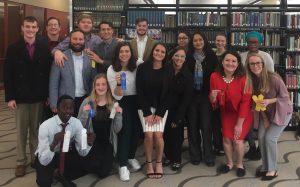Solving some of the world’s toughest crises may seem like a daunting task, but according to junior political science and international relations major Kaitlin McDonald, the chairwoman for Council 1, the Model United Nations course tackles these political concerns on the daily. Model UN is a simulation exercise in which various student teams work to emulate the actual United Nations. The students take on the roles of the multiple nations involved and work towards resolving key global conflicts.
The group of students enrolled in IREL 300 Model United Nations attended a conference at Indiana University Southeast. The students spent the semester preparing to represent a variety of countries and discuss and debate five selected topics with students from other universities. They won several awards for their performances.
“Two students are assigned a country and have to learn everything about those countries. This includes their policies, their allies and enemies and their specific stance on the five agenda items assigned to the mock conference,” McDonald said. “At the conference, the students engage in formal and informal communications with delegations from their school and other schools to discuss possible solutions to each of the five topics.”
According to McDonald, the five agenda items for this conference were: the crisis in Venezuela, the crisis in Yemen, the crisis between Israel and Gaza, the crisis between Rohingya and Myanmar, and the crisis in the Democratic Republic of the Congo. She notes that a huge amount of research goes into preparing for the United Nations conference.
“Preparing for this class is not easy. As a representative, you need to do extensive research over your country. This includes knowing all your relationships with each member of the security council. You also need to do in-depth research on the agenda items,” McDonald said. “Once you are assigned your topics, you further research all involvement your country has had with each of the crises. Once you find out the stance of your country, you then look into who you side with and who you will need to work with at the conference to pass a resolution.”
Junior political science and philosophy double major Mason Hamilton represented the USA at the conference. He noted that preparation can differ from country to country. For smaller countries like Kazakhstan, whose breadth of specific available information is slim, the research may focus on a broad understanding of the country. Hamilton, portraying a large nation like the United States, had to be more specific in his research.
“I had to dig through all of the excess information to find useful stuff that actually spoke to the problem that we were examining,” Hamilton said. “I was just trying to find information that, for the United States, represents the actual government interest.”
At the November 2018 Model United Nations Conference at Indiana University Southeast, the University of Indianapolis team had a strong performance, winning several awards. Senior political science and international relations major Evan Smiley said that having Model UN as an actual class gave UIndy an advantage over the competition as have regular meetings and take it seriously.
“Most of these other schools just do [Model UN] as a club. We take it more seriously, and we were more prepared too because we get a grade for this,” Smiley said. “A big thing about the UN conference itself is passing resolutions. We had resolutions already ready because that’s what we worked on in class, and we were able to easily facilitate getting these resolutions passed because we already had stuff to work with.”
All three agreed that participating in Model UN is beneficial not only to a potential career in politics, but also in bolstering communication skills.
“I feel as though MUN is a great class to help prepare students for their future,” McDonald said. “Not only does it let you practice public speaking, but it allows students to act diplomatically in a setting where they aren’t judged or under high pressure.”







